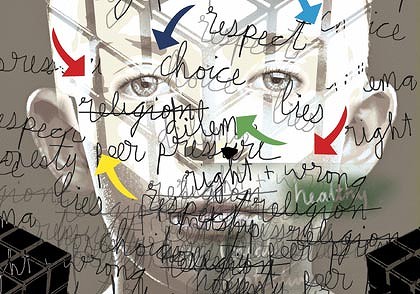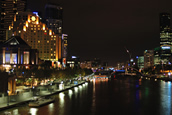
An ethics class will be trialled on year 5 and 6 students across 10 state primary schools.
You have already accepted an invitation to a birthday party from a classmate when your best friend hands you an invitation to their party, to be held on the same day. What do you do?
This will be the introductory scenario faced by year 5 and 6 students electing to do a 10-week ethics class trial in 10 state primary schools, scheduled to start this week.
The pilot will test the concept of offering an ethics-based alternative for students in NSW whose parents choose not to send them to scripture classes. Under the current policy, students who don't attend scripture classes spend their time reading, colouring-in or watching DVDs. Nathan Rees, when premier, approved the pilot proposal, put forward by the St James Ethics Centre.
Dr Simon Longstaff, the executive director of the St James Ethics Centre, says some groups are being punished by opting out of special religious education (SRE), as policy provides for the supervision of these children but states they are not to have access to ethics, values, civics or general religious education during this time.
''The ethics program is a meaningful alternative that builds on what is already done, complementing the ethical questions that take place in SRE. All NSW students should have something meaningful to do during this time,'' Longstaff says.
''Members of various faith groups believe there should be an exclusive offering from faith groups, but I can't understand where the concern lies. Nothing is being taken away, rather something is being added.''
Helen Walton, of the Federation of Parents and Citizens' Associations of NSW, agrees.
''It has taken seven years of serious, hard work to get to this point. For parents there has been a genuine concern about their children sitting in classrooms, doing nothing, for up to an hour, every week,'' Walton says.
''In some schools it's as high as 50 per cent of students opting out of SRE. We are certainly not promoting the removal of scripture, but parents who opt out of SRE should have the option of a meaningful alternative for their child.''
Volunteers who will run the ethics course, and were selected from within the pilot school communities, assembled for training for two days in March.
The 33 volunteers include a goat farmer, a music therapist, lawyers, a former principal, nurses, a stand-up comedian, and a film producer.
The most common characteristic is they have a child at one of the pilot schools - and they each have a story about the competitive process involved to secure a place at training.
Associate Professor Philip Cam, of the University of NSW, developed the curriculum and conducted the training workshop. Cam is an expert in philosophical and ethical inquiry for children, and recently co-authored guidelines on incorporating ethical behaviour for the draft national curriculum.
The two-day workshop was run in classroom mode, replicating the methods to be used when it is introduced to classrooms this week. Volunteers were seated in a circle and needed to have possession of the speaker's ball before commenting. ''No put-downs'' was also part of the rules.
Cam stressed that it was not the role of the volunteer ''teacher'' to ethically instruct the children, but rather explore ethical ideas and facilitate a discussion among members of the class. Good listening, an awareness of when to intervene, and a light touch would be necessary.
He warned against buying into the discussion, as that could change the dynamic in the room and students would be listening for the ''right'' answer.
''It is about dealing with kids making reasoned judgments, the business of thought. And learning to be reasonable with people you disagree with, not attacking them, and providing reasons as to why you disagree,'' Cam says.
''We all come with ethical cultural baggage, it comes from Plato and Aristotle and Socrates, but there is a difference between being dogmatic, unreflective and accepting traditional hand-me-down beliefs, and examining what you think and why.''
The sessions covered during the 10 weeks will include: fairness; lying and telling the truth; ethical principles; graffiti; thinking about animals; intervening in nature; virtues and vices; and children's rights. Scenarios are presented, discussed in small groups, then views and opinions shared in the class.
Volunteers who felt the party invitation scenario was a simple one - you must honour the first commitment made - lost all certainty as the group conversation evolved.
Promises, friendships, our own happiness, individual differences, the impact of our actions on others, and consequences for ourselves, were all examined.
Individuals and small groups came up with myriad reasonable solutions (that didn't involve lying) derived from thought and discussion. And this was one of the easier scenarios dissected during training.
Ethical principles, seemingly inviolable at face value, were applied to concrete scenarios where they became less definite, such as keeping a promise although it may compromise the safety of a friend.
The course concludes with a session asking ''What is necessary for a person to have a good life?'' Participants are asked to evaluate factors such as: having lots of money, being a virtuous person, having lots of friends, and a long life.
Cam says this question is central to ethics and, in his experience, not beyond a 12-year-old.
If the training is an accurate measure, the course will be challenging, engaging and thought-provoking in classrooms.
As a facilitator, Cam exemplifies fair, good listening and he is adept at encouraging people to think.
''Go away knowing you have less right to be sure about this. You thought it was clear, and came in knowing it all, but when challenged you realise you don't know it all,'' he told the volunteers at their training session.
''Now, that's education - contestable, not settled, common, everyman. The serious questions of life and society are open ones and kids need to know that.''
When questioned if this is beyond children who may be seeking more concrete answers, Cam says, ''By this stage in primary classrooms it has shifted from teacher knows best - so this won't be unfamiliar. It just isn't the case that kids want to be taught what to think. Kids are delighted for the opportunity to express themselves and think for themselves, some are already showing by this age resistance to being told 'what' to think.''
The volunteers came across as thoughtful and careful about their influence on students, while still regarding themselves in a privileged position. Some challenged Cam over minor course content - the use of a certain word, the handing out copies from the United Nations Convention on the Rights of the Child.
They debated whether handouts were equal to an endorsement, demonstrating the understanding that their classroom activities may be closely scrutinised. Some expressed concern about the perception of encouraging students to go home and assert their rights.
''The compelling point of a pilot is to test to see what works, and what doesn't work. It can be modified on the basis of combined experience,'' Cam says.
He is often asked ''whose ethics?'' and concedes this is controversial.
"It is less of an issue for faith-based groups who come with an ethical code that is official in that faith, but in a secular field, the answer is not promulgating any set of ethical edicts - it is not set. It's philosophical inquiry, not a set of instructions."
The ethics pilot will be overseen by an independent assessor, who will then prepare a report for the Department of Education and the minister.
Longstaff says he hopes to see an extension of the pilot program. ''It's good for children, good for families and good for the community - and not taking away from anything."
Others have a different view.
The Anglican Archbishop, Dr Peter Jensen, wrote an article entitled ''Ten reasons the ethics trial is not a good idea'' in the Anglican publication, Southern Cross.
"The non-religious St James Ethics Centre has already received wide exposure … boosted by those who see this as a chance to break SRE and remove all trace of religion from public life," Jensen wrote.
He argues that there is an implication that teachers are not doing their job teaching mainstream ethical behaviour and that the course is presented as new, exciting and more useful than SRE, which may lead to fewer children choosing it.
The study of religion is vital to an understanding of our culture, art, faith and human history, Jensen writes.
He also says the course should have a more accurate name, such as ''secular philosophy'' and raises concerns about the proper screening and training of the volunteers and their connection to the school.
By providing the pilot, the government has also reneged on an assurance given to churches since 1880 (and reaffirmed in 2008), he points out.
"Be warned: if the government allows this course to continue after the trial, it will jeopardise religious education in public schools, and without such a religious component, public schools will cease to be inclusive of all children," Jensen writes.
The article asks readers to "urgently pray about it, then make your views known to your local MP" and concludes: "There will be many challenges ahead for Christians in the society of the 21st century, but few more significant than this."
Now we have a scenario worth discussing.
AT THE COALFACE
''I am not anti-scripture but … I see this project as giving children tools for applying critical thinking to decisions in everyday life. It's not dissimilar to scripture.
I would like the children in my class to be able to see other points of view and while they may not agree, see they are valid and recognise that others can arrive at a differing view in a considered, thoughtful way.
"The training was well structured. They were the kinds of concepts I studied at university but made very child-friendly and appropriate. It was pitched perfectly. It's a really exciting course to be involved with. I'm busy but wanted to make the time to do this. I can run a Supreme Court hearing in a day and a half, so I felt two days' training may be excessive. But not at all."
Jane Needham barrister and volunteer from Darlinghurst Primary School.
"My kids do colouring-in during good learning time. Scripture is in the morning when they are at their best. Having done the training, I am now certain it will help their thought processes where others may look to their religion for guidance. The school is very supportive and people have overcome the belief that because it's not religious it must be anti-religious."
Benita Cornish volunteer from Bungendore Primary School who will be teaching 53 students who have opted for the ethics pilot.
''We had more people volunteering than we could possibly [cope with] … We were looking for open-minded and inquiring people. This was absolutely essential - not people who wanted to moralise with kids and tell them what to think."
Curriculum developer, Associate Professor Philip Cam, from the University of NSW.
PURE BLACK AND WHITE, OR SHADES OF GREY?
Children discuss whether the following scenarios are fair, unfair or they are unable to decide.
Although Tim tries hard in maths, he always received poor marks.
Bethany knew who had broken the classroom window, but she wouldn't tell. So the teacher punished her.
Simon's group makes it a rule to always do what the majority wants.
Since it was hot, students who arrived first sat in the shade. Those who arrived later had to sit in the sun.
Children discuss lying and telling the truth, and decide whether the following scenarios are less or more acceptable.
Someone tells a big fat lie to their friends just to see how they'll react.
Your grandma has knitted you a sweater. You tell her how much you like it when in fact you don't like it at all.
All of your friends got full marks in last Friday's test. You feel so embarrassed by your mark that you lie to them by saying that you got full marks, too.
Source: St James Ethics Centre ethics pilot program













